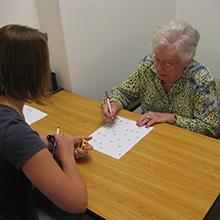19 June 2023

These oldest-old are also less susceptible to other types of neurodegenerative changes
Irvine, CA – A University of California, Irvine-led team of researchers have discovered that the oldest-old, those who live to be 90+ and have superior cognitive skills, have similar levels of brain pathology as Alzheimer’s patients, however, they also have less brain pathology of other neurodegenerative diseases that cause memory and thinking problems.
The study, “Superior Global Cognition in Oldest-Old is Associated with Resistance to Neurodegenerative Pathologies: Results from the 90+ Study,” was published in the Journal of Alzheimer’s Disease.
“People who are 90+ and still have good memory and thinking abilities tend to have similar levels of Alzheimer’s pathology in their brains,” Roshni Biswas, post-doctoral scholar with The 90+ Study. “Our findings indicate that while Alzheimer's Disease neuropathological changes and vascular changes are common in their brains, these individuals are less susceptible to other types of neurodegenerative changes such as Lewy body disease.”
Age is the primary risk factor for cognitive issues, such as Alzheimer’s, Lewy body disease and other related dementias. Over the past 30 years, the number of people aged 90 and older in the U.S. has nearly tripled, and this number is projected to quadruple in the next four decades.
With this rise in age, many people see increased problems with memory and brain function. However, little data is available on the changes in the brains of 90+ people who maintain superior cognitive abilities, despite their age.
The objective of the study was to examine the brain features of people without cognitive impairment and their relation to superior cognitive skills and reasoning in those that are 90+.
“There are some individuals who can maintain high levels of cognitive function well into advanced ages,” said María M. Corrada, ScD, co-principal investigator of the study and professor in the Departments of Neurology and Epidemiology & Biostatistics at UCI School of Medicine. “Further research into the factors that enable these individuals to maintain their cognitive function could provide insights into how to preserve cognitive health despite advanced age.”
The study results were derived by analyzing autopsy data from 102 cognitively normal individuals who died at a mean age of 97.6 years. They also used cognitive test scores from people taken between two to twelve months before death. The average age of study participants at the time of their last visit was 97.1 years of age.
“In our future research, we will examine how lifestyle habits and health conditions are associated with superior cognition in individuals who are 90+ and the factors that contribute to maintaining stable cognitive function over time,” said Biswas.
The 90+ Study is a longitudinal study on aging and dementia that was initiated in 2003 to study the oldest-old population, which is the fastest growing age group in the United States.
With more than 2000 participants enrolled, it is now one of the largest studies of its kind in the world. The project has produced several significant findings regarding cognitive function, health and lifestyle habits in the oldest-old population information obtained during life.
This work was supported by the National Institutes of Health.
UCI School of Medicine:
Each year, the UCI School of Medicine educates more than 400 medical students and nearly 150 PhD and MS students. More than 700 residents and fellows are trained at the UCI Medical Center and affiliated institutions. Multiple MD, PhD and MS degrees are offered. Students are encouraged to pursue an expansive range of interests and options. For medical students, there are numerous concurrent dual degree programs, including an MD/MBA, MD/MPH, or an MD/MS degree through one of three mission-based programs: the Health Education to Advance Leaders in Integrative Medicine (HEAL-IM), the Program in Medical Education for Leadership Education to Advance Diversity-African, Black and Caribbean (PRIME LEAD-ABC), and the Program in Medical Education for the Latino Community (PRIME-LC). The UCI School of Medicine is accredited by the Liaison Committee on Medical Accreditation and ranks among the top 50 nationwide for research. For more information, visit medschool.uci.edu.
Grant info:
This work was supported by NIH grants: R01AG21055, UF1 AG057707, and P30AG066519.
Conflict of Interest Disclosures:
Roshni Biswas, Claudia H. Kawas, Syed A. Bukhari, and Maria M. Corrada declare no conflicts of interest.
From 2019-2022, Luohua Jiang served as a paid advisor on the Scientific Advisory Board of Birkeland Current, a small business that was funded by the National Institute on Aging to develop a medical device that monitors impacts of cognitive decline on Activities of Daily Living.
Thomas J. Montine receives royalties from Up To Date.
The study sponsors had no role in the study design; in the collection, analysis, and interpretation of data; in the writing of the report; and in the decision to submit the paper for publication.
Keywords: Alzheimer’s disease, cognitive aging, neurodegenerative disease, oldest-old, successful aging, vascular
DOI: 10.3233/JAD-221062 IOS Press
Caption: The 90+ Study, one of the largest studies of its kind in the world, used cognitive assessment test scores from some of the more than 2000 participants enrolled,. The project has produced several significant findings regarding cognitive function, health and lifestyle habits in the oldest-old population information obtained during life.







